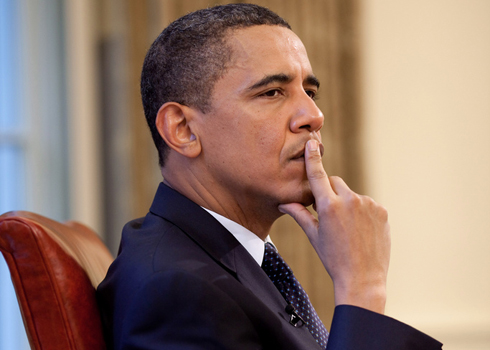While President Obama and Speaker John Boehner (R-OH) remain optimistic that Republicans and Democrats can strike a budget deal and avert a looming government shutdown by Friday’s deadline, the White House’s Office of Management and Budget is planning for the worst.
“From a good housekeeping perspective, we’re cognizant that it’s Wednesday and the deadline is Friday and so we need to take appropriate steps should appropriations lapse,” a senior administration official told reporters on a conference call Wednesday.
Obama called Boehner and had a brief three-minute conversation this morning about the status of ongoing negotiations over a spending cuts to a bill that would fund the government through September.
Boehner reiterated that the House’s goal is to prevent a government shutdown and make real cuts in spending, which he argued is essential for economic growth, according to a readout of the call released by Boehner’s office. Boehner told the President he remains hopeful a deal can be reached and that talks would continue.
Here’s a brief run-down of government services and employees that would be affected and those that wouldn’t, if the budget impasse continues past Friday and the government shuts down for the first time in 15 years.
Very broadly, all activities that are “necessary for safety-of-life or protection-of-property” would continue, if the government shuts down, according to the senior administration official said.
Each agency and office in the executive branch would determine which employees are essential and which are non-essential. The essential employees would show up for work during the shutdown period. The rest, an estimated 800,000, would be furloughed.
The same would be true for Congress and the judicial branch, although top officials in each of those branches would determine their own list of essential and non-essential employees and government functions.
⢠The military–Both military and some essential civilian employees at the Department of Defense would continue to work and earn their salaries, although they would not be paid if the government shutdown continues beyond April 8. Once Congress reaches a deal and approves the spending bills for the rest of the year, military and civilian DoD employees would get paid their full salaries. Non-essential civilian DoD staff would be furloughed.
⢠Department of Homeland Security–Would remain up and running, and like DoD, it’s essential employees would continue to earn their salaries during the shutdown period, while employees considered non-essential would be furloughed.
⢠The IRS–The government shutdown would occur in the middle of peak tax season. The processing of paper tax refunds or paper-filed returns would be suspended, as well as all tax audits, during the shutdown. But electronic returns and refunds would still be processed.
⢠Social Security–Current beneficiaries would continue to receive their checks.
⢠Medicare–Current beneficiaries would continue to receive their payments unless the government shutdown lasts for months and the trust fund runs out of money, although that scenario is highly unlikely.
⢠Small Business Administration–The SBA would stop approving business loan guarantees and direct loans, which would have a “significant impact” on the economy, the official said.
⢠Federal Housing Authority–All loan guarantees would cease during this period. In 1995, during the last government shutdown, the FHA-guaranteed loans represented 12 percent of the mortgage market. Today, that figure has grown to 30 percent.
“We’re in peak home-buying season when a disproportionate number of home transactions are done so having the FHA not able to guarantee loans would have an impact on our economy, which is very fragile,” the official said.
⢠National Parks–Closed and workers furloughed. The Smithsonian Institute would be closed and the Cherry Blossom festival and parade in D.C. would not happen this weekend.
⢠Health and Human Services–Would not admit any new patients in clinical trials or begin new clinical trials. Clinical trials that are already underway would continue.









